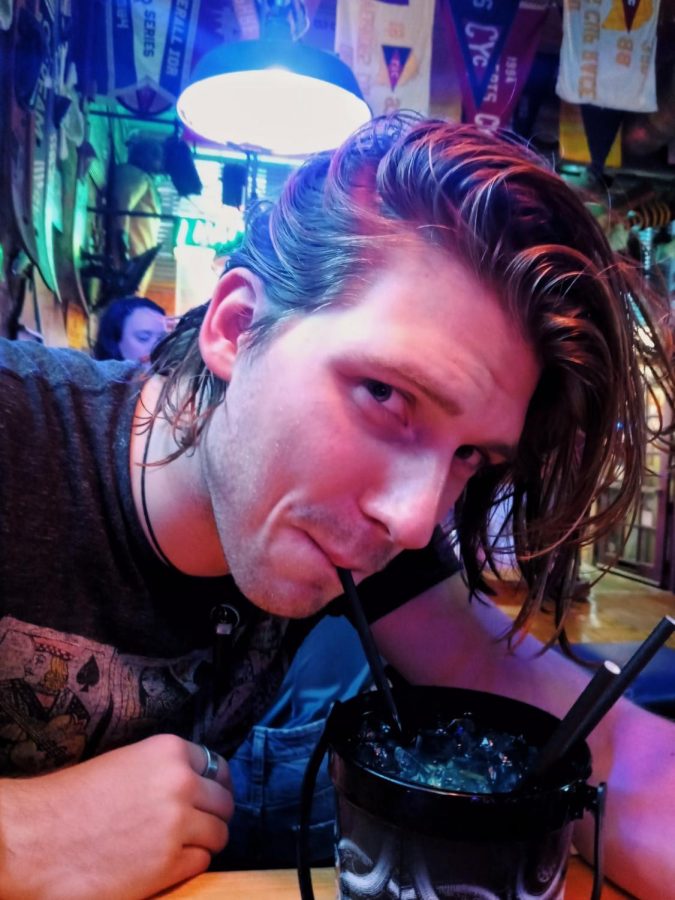Wondering where to go this weekend? Here’s our review of the best karaoke bars in Chicago
Jack Austin/The Daily Northwestern
Alex Ceko, an avid karaoke fan, drinking a cocktail at Trader Todd’s, a karaoke bar in Lakeview.
April 23, 2023
It all started with a now signature duet of “When You Were Young,” by the Killers.
Alex Ceko could almost taste the glory of the spotlight and the warmth of the applause. He sipped on a $3 margarita from Flaco’s Tacos, just down the street from Brando’s Speakeasy –– a fixture of his Monday night ritual — imagining the stage and the crowd.
As a junior at DePaul University, Ceko started frequenting Brando’s as part of his Monday night karaoke routine.
Ceko walked down the street to the speakeasy and put in a song request week after week. He would bide his time until he had to perform, fueling himself with liquid courage in his apartment above the bar. The highlight of the night, of course, is always his performance of “When You Were Young”, Ceko said, and he had practically perfected it with time.
Ceko, now pursuing a master’s in writing and publishing at DePaul (and a former School of Professional Studies student at NU), said that he enjoys karaoke for its small taste of fame, in addition to the supportive environment.
“What I like about karaoke — I love rock stars,” Ceko said. “I love the idea of a rock star. I love reading what it looks like to be cared for by thousands of people, to be wanted like that. When I karaoke, I get a taste of that.”
Karaoke bars are not hard to come by in the Chicago area. Many cater to unique tastes and offer their own spins on the activity. Ceko enjoys many of these karaoke bars, including Trader Todd’s, and Sakura Karaoke bar, but said his favorite will always be Brando’s.
Trader Todd’s in Lakeview has its own flair. The bar employs a karaoke host that guides programming, typically experienced in stand up and radio work, according to general manager William Gold.
They also adhere to a tropical theme, decorating in what Ceko described as “Jimmy Buffett” style and offering large fishbowl cocktails.
The bar attracts a young crowd, and most performers at Trader Todd’s sing crowd-pleasing popular songs. Ceko said “Livin’ on a Prayer” and “Don’t Stop Believin’” are regulars. Though, Gold said the bar plays many genres — Lady Gaga could follow a Frank Sinatra cover.
By contrast, Brando’s Speakeasy feels like it could double as a cigar lounge during the day with its leather interior, dark colors and drapes, Ceko said.
Unlike Trader Todd’s, customers tend to sing more personal favorites than crowd pleasers. On several occasions, Ceko said he saw people who could pass for Santa Claus perform incredible renditions of Bob Seger, even better than the original “Turn the Page” in one instance.
Bobby Love , owner of Bobby Loves in Boystown, said his bar attracts many regulars and “quality singers,” quite unlike what he called “typical screeching karaoke.” Love said that when the cast of “Wicked” stopped in town several years ago, they came to sing karaoke at Bobby Loves on two consecutive nights, electrifying the crowd.
Songs at Bobby Loves, which opened 24 years ago, range from broadway to hip-hop, Love said.
Gold said some of his more memorable nights at Trader Todd’s include when a group of friends dressed up to sing as much of the “Hamilton” catalog as they could, and once when another patron came dressed as a turkey. He added that karaoke is a means of creating a communal atmosphere, especially in a digital era.
“People are used to communicating through a screen and (are) probably a little bit shy interacting in person,” Gold said. “When you see somebody singing your favorite song right next to you (at a karaoke bar), it’s a little bit more relatable.”
For aspiring karaoke stars suffering from stage fright, many venues offer more private rooms, like Sakura Karaoke Bar in Chinatown.
Across all environments, karaoke largely exists as a judgment-free zone. Ceko said he often sees excellent vocalists who always dreamed of singing utilize karaoke to overcome their stage fright. More than anything, Ceko said karaoke provides a fun, jovial atmosphere.
One day he was in the audience, he said, and the next, he was on-stage, becoming a regular performer. No experience or skill is required — only the desire to sing.
“I’d always sung along to songs, always in the car, at parties, out in the grocery store, the shower — wherever, as loud as I could,” Ceko said. “I didn’t give a (damn), I didn’t even care who was listening. So I always felt like karaoke was for me.”
Email: [email protected]
Twitter: @JackAustinNews
Related Stories:
— Moyana Olivia’s powerful voice, emotional lyrics garner fans on campus
— Chicago-based alt rock band splits release 2nd EP “vice versa” amid pandemic


